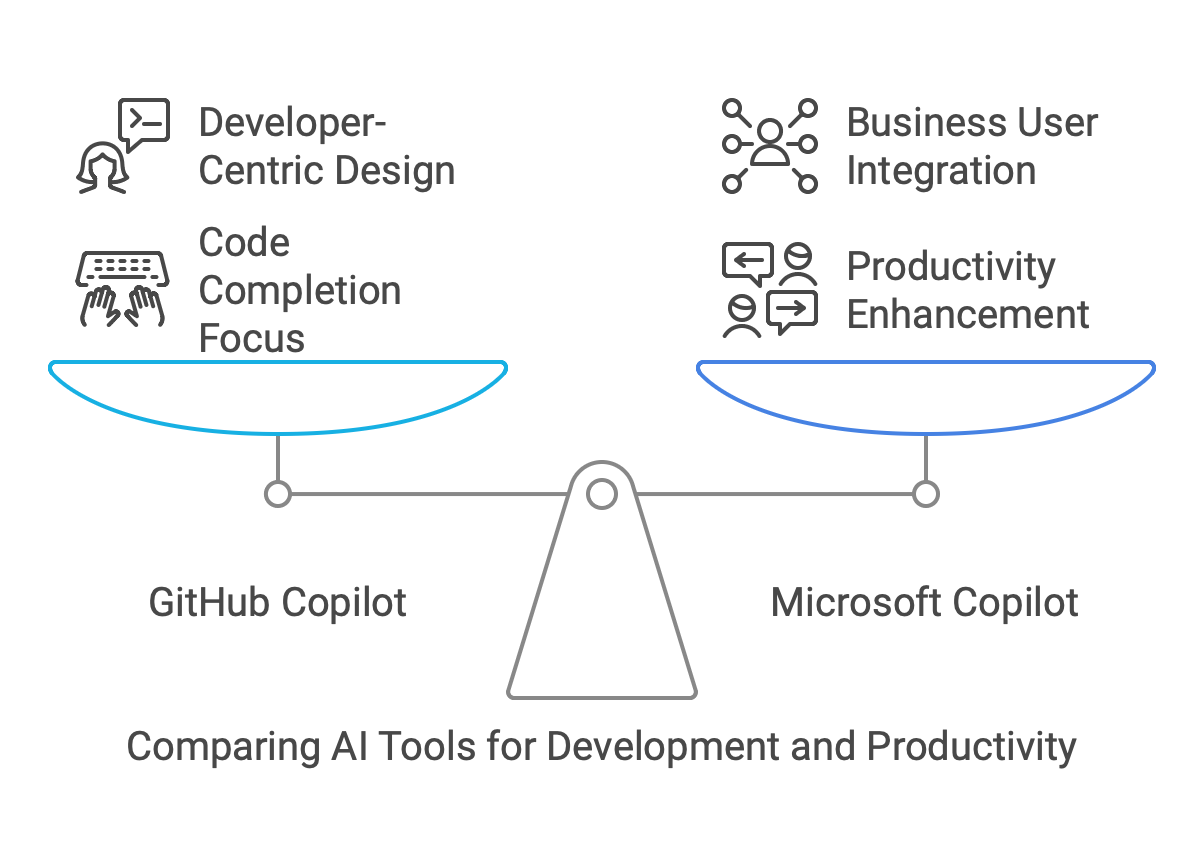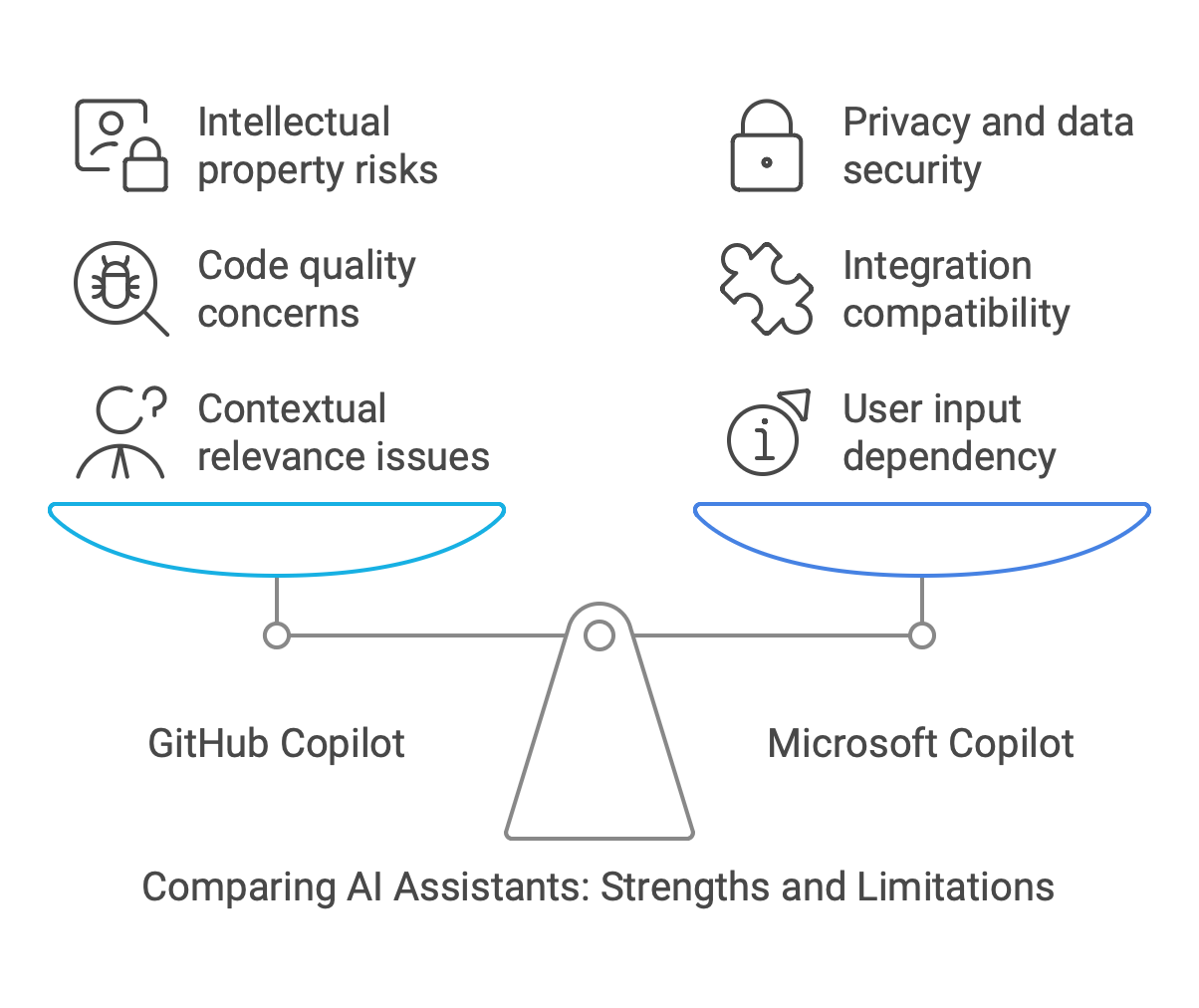
In software-development, speed is key. So, efficiency and productivity are vital. Enter AI-powered code assistants: tools designed to enhance coding experiences and streamline workflows. Among these solutions are GitHub Copilot and Microsoft 365 Copilot. They are two heavyweights in AI. They aim to change how developers work. Writing code or documents? There’s an exciting journey ahead in this comparison!
GitHub Copilot, a joint effort between GitHub and OpenAI, is an AI coding assistant. It uses machine learning to give developers real-time code proposals as they type. Copilot provides suggestions based on a massive dataset of public code repositories, aiming to boost coding efficiency by significantly reducing time spent on repetitive tasks.
Both tools aim to simplify workflows but serve different audiences. GitHub Copilot X is for software developers, while Microsoft-Copilot is for office productivity in various sectors. Each has its strengths to help us work with technology better.
GitHub Copilot is revolutionizing the coding experience with its AI-powered suggestions. It assists developers in real-time. GitHub Copilot integrates machine learning to predict and complete code snippets based on context. When you start typing, GitHub Copilot analyzes your input and offers relevant completions. This instant feedback can significantly speed up programming tasks.
They get relevant suggestions at just the right time. It’s like having an experienced colleague by your side at all times. Using Microsoft Copilot, for example, can enhance this experience.
Microsoft-Copilot works perfectly with the Microsoft 365 suite. It enhances the user experience across familiar apps. By embedding AI in Word, Excel, and PowerPoint, it transforms how users create content.
AI can make PowerPoint presentations dynamic. It can create slide layouts and design ideas based on your content. The integration streamlines workflows, making collaboration easier among teams scattered around the globe.
The powerful combo of Microsoft-Copilot and Microsoft 365 boosts creativity and productivity in business. Users find themselves empowered by having an intelligent assistant at their fingertips.
When comparing GitHub Copilot and Microsoft-Copilot, their primary focus becomes evident. GitHub Copilot is for developers. It offers AI-driven proposals for code in the coding environment. It thrives on knowing programming languages and frameworks. So, it’s a top tool for software engineering. Another notable difference is their underlying technologies.
Both use advanced AI models. But, GitHub’s model focuses on understanding coding syntax. Meanwhile, Microsoft’s model adapts to the diverse needs of general office tasks. User experience varies significantly. One caters to coders, the other to everyday users. Each service carves its niche in an increasingly tech-driven landscape.
GitHub Copilot and Microsoft-Copilot significantly elevate software dev by streamlining workflows. GitHub Copilot is an AI-powered coding tool, offers real-time proposals for code based on the context. It helps developers save time by automating repetitive tasks. Both tools reduce cognitive load for developers and users alike. This focus lets them tackle complex problems, not syntax or formatting issues. AI in these platforms makes help just a keystroke away. It fosters creativity and innovation in projects across various domains.
GitHub Copilot has significantly transformed the coding landscape. It uses advanced AI algorithms to offer real-time code proposals as developers type. This instant feedback streamlines the coding process and helps reduce common errors.
The tool not only completes lines of code. It also generates entire functions based on comments or initial prompts. This feature lets programmers spend less time on syntax and more on problem-solving. GitHub Copilot is a coding partner for all levels. It offers insights that can spark new ideas and save time.
Microsoft-Copilot transforms productivity by seamlessly integrating AI into everyday tasks. It acts as a smart assistant across various Microsoft applications, enhancing user experiences. Within Word, it helps draft content and suggests edits.
Users can focus more on creativity while Copilot Pro handles formatting and grammar checks. Excel’s automated data analysis can find insights that would take hours to discover.
Microsoft-Copilot boosts teams by streamlining workflows and cutting dull tasks. They can achieve more in less time. This innovative tool boosts efficiency and encourages collaboration across departments for better results.
The AI-models powering GitHub Copilot and Microsoft-Copilot are very different. Their architecture and training data are not the same. GitHub Copilot leverages OpenAI’s Codex, a descendant of the GPT-3 model. It is trained on vast public code repositories.
GitHub targets software developers who want to code efficiently, while Microsoft aims to help business users work better with its office apps. This foundational difference shapes how each assistant, Cody vs Copilot, interacts with its respective audience.

GitHub Copilot shines in its versatility. It supports many IDEs and platforms. It integrates with Visual StudioCode and Visual Studio, so proposals for code are easy to access in familiar environments. The GitHub Copilot extension in Visual Studio Code, for example, enhances workflow efficiency for many programmers. This flexibility enhances workflow efficiency for many programmers. Both tools cater to distinct audiences. One is for developers. The other supports business professionals with various tasks. Yet, it’s noteworthy that GitHub Copilot works beyond traditional IDEs. It also runs on online coding platforms like Replit.
GitHub Copilot works with two popular IDEs: Visual Studio and VSCode. It enhances coding by suggesting ideas in real time as developers create code. In Visual Studio, Copilot offers context-aware completions tailored to the existing code. It understands various programming languages and frameworks, making it versatile for different projects.
The integration feels natural. It lets users focus on creativity, not syntax errors. VSCode benefits similarly from this powerful AI assistant. Developers can access GitHub Copilot in their workspace. It gives smart prompts to speed up development.
Each suggestion is informed by a vast dataset, ensuring relevance and accuracy. This dynamic collaboration between GitHub Copilot and these IDEs makes productivity soar. With fewer interruptions for debugging or searching docs, developers can work better. They can build innovative solutions.
Microsoft-Copilot works with many Microsoft apps, improving the user experience across platforms. It works within Word, Excel, PowerPoint, Outlook, and now Microsoft Edge, offering real-time assistance. In Word, Copilot helps generate content and improve writing clarity.
Users can receive suggestions for rephrasing or expanding ideas effortlessly. It analyzes data trends and automates tasks for Excel users. It formats data and creates complex formulas. This significantly speeds up workflows.
Each tool boosts collaboration and reduces users’ cognitive load. It lets them focus on creativity, not mundane tasks.
GitHub Copilot is designed to enhance coding across various platforms. It also integrates with JetBrains IDEs, like IntelliJ IDEA and PyCharm. It works better than with Visual Studio and VSCode. This lets developers, familiar with these environments, use AI suggestions in their tools.
Microsoft-Copilot takes a different approach. It embeds its features into Word, Excel, and PowerPoint. Users can use AI for help while creating documents or analyzing data in spreadsheets. Microsoft wants to integrate more into Teams and SharePoint. This strategy gives users access to smart help, no matter where they work.
GitHub Copilot offers a straightforward pricing model. Users can choose a monthly or annual subscription. It gives access to AI-powered coding help. A free trial is available. It lets users test its effectiveness before committing. Both services aim to provide value through their unique offerings. They target different users. Developers want code solutions. Office workers seek to boost productivity. This difference affects how organizations choose a service. It must fit their needs and budget.
GitHub Copilot offers a flexible subscription model to cater to various user needs. For a monthly fee, individuals can access the service. It is an effective solution for freelancers and hobbyists. It helps them boost their coding efficiency.
GitHub offers a plan for teams and organizations. It has advanced collaboration features. This helps developers on large projects where teamwork is vital. The ease of onboarding makes it accessible even for those new to coding tools. It lets users quickly check if it fits their workflow before spending money.
Microsoft-Copilot, an AI-powered tool, is built to work with Microsoft, enhancing the user experience across its apps. The licensing for this tool typically falls under the existing Microsoft subscriptions.
Users can access Copilot features without needing additional plans. This makes it a good option for organizations using Microsoft’s tools. Businesses should monitor these developments. It will help them get the most from their investment in Microsoft and its AI assistant.
To evaluate the cost-effectiveness of GitHub Copilot and Microsoft-Copilot, several factors matter. GitHub Copilot is a subscription service. It offers individual plans for developers.
| Feature | AI Assistant A | AI Assistant B |
|---|---|---|
| Initial Setup Cost | Low/High (depending on provider) | Low/High (depending on provider) |
| Subscription Cost | $X/month | $Y/month |
| Customization Options | Flexible/Inflexible | Flexible/Inflexible |
| Efficiency (Task Accuracy) | High/Medium/Low | High/Medium/Low |
| ROI Over Time | High/Moderate/Low | High/Moderate/Low |
| Maintenance Costs | Minimal/Moderate/High | Minimal/Moderate/High |
The pricing provides access to advanced coding suggestions. It allows users a free-trial to assess its value. It’s crucial to consider user needs as well. For solo developers or small teams, GitHub’s dedicated service may be better. It is more helpful for coding. Larger enterprises using various Office apps might find Microsoft’s offering best. It’s seamless and cheaper for cross-platform workflows.
GitHub Copilot uses a large dataset of public code. It aims to ensure code security and privacy. It suggests ideas based on patterns. It does not store any personal or proprietary code it finds during use. Users should be careful with generated snippets. They may introduce vulnerabilities. Both tools stress ethical AI use. But, developers must watch for risks in auto-generated content. Users must continuously monitor and use discretion. They are vital for secure coding, no matter which assistant is used.
GitHub Copilot uses advanced machine learning. It suggests code that is relevant and contextual. It analyzes vast amounts of public code. Then, it generates snippets to help developers write code faster and more efficiently.
Developers can rely on Copilot to keep their private repos secure within their code editor. This approach fosters trust while enabling seamless coding experiences. GitHub emphasizes transparency in its AI processes, allowing users to see how suggestions are based on their work patterns without compromising sensitive data security. A comparison with BitBucket vs GitHub might help developers choose the best platform for their workflow.
Microsoft-Copilot prioritizes security, seamlessly integrating with Microsoft Security protocols. This ensures that sensitive data remains protected while users use Copilot to leverage AI-powered assistance.
The tool benefits from built-in features like identity management and threat detection. These mechanisms help safeguard user information against unauthorized access and potential vulnerabilities. Regular updates further enhance its security posture, addressing emerging threats proactively.
Using machine learning, Microsoft-Copilot evolves its defenses against new threats. This proactive approach increases trust in organizations using the platform for vital Microsoft 365 tasks. The integration boosts productivity. It also secures users’ work environments.
As people use AI assistants like GitHub Copilot and Microsoft-Copilot more, ethical concerns about them are growing. Transparency is a significant concern. Users want to know how these tools generate suggestions and which data they use. Data privacy also plays a crucial role in ethical discussions.
| Aspect | AI Assistant A | AI Assistant B |
|---|---|---|
| Data Privacy | Strong/Weak protections | Strong/Weak protections |
| Bias and Fairness | Mitigated/Unaddressed biases | Mitigated/Unaddressed biases |
| Transparency | Clear/Obscure decision-making | Clear/Obscure decision-making |
| User Control | High/Moderate/Low control | High/Moderate/Low control |
| Impact on Employment | Minimal/Significant | Minimal/Significant |
| Environmental Impact | Low/High resource usage | Low/High resource usage |
Both platforms must keep user data secure and not exploit it. There’s an ongoing debate about bias in AI-models. If not managed, both Copilots could spread biases in their training data. This would harm fairness in software dev. Addressing these concerns requires continuous dialogue among developers, users, and technology providers alike.
GitHub Copilot, while innovative, has its limitations. It sometimes struggles with complex coding tasks or niche programming languages. Users may find that the suggestions lack context or relevance in these scenarios. This can slow down development instead of speeding it up. Both AI assistants also run into issues regarding code quality and accuracy. They may generate solutions that are syntactically correct but logically flawed. Developers should always review generated-code carefully before implementation. Considerations around data privacy arise with both services. Organizations that prioritize security in their workflows fear mishandling sensitive information.

While GitHub Copilot offers remarkable assistance, it is not without its challenges. One notable drawback is the occasional lack of context awareness. The AI may generate code-snippets that seem relevant. But, they may not suit your project’s needs.
Another concern revolves around dependency. Over-reliance on Copilot can lead to a decline in fundamental coding skills. Developers might skip learning critical concepts. They expect instant solutions from the tool.
Users should be mindful of intellectual property issues surrounding generated code. Without proper attribution, using some snippets could infringe on existing copyrights.
Microsoft-Copilot, while a powerful tool, has its limitations within the Microsoft ecosystem. One notable constraint is its dependency on user input quality. If the prompts or questions posed are vague, the responses can be equally unclear.
Another challenge arises from integration compatibility. Not all features of Microsoft Office applications may support Copilot seamlessly. This inconsistency can frustrate users. They expect help, but it isn’t available in every context, particularly when using Visual Studio 2022.
Privacy and data security are a concern. Sensitive information could be exposed when using the AI. Organizations must protect their data when using these advanced productivity tools. They must be vigilant.
When it comes to AI code assistants, accuracy and reliability are paramount. GitHub Copilot leverages vast amounts of open-source code to provide contextually relevant suggestions.
Its effectiveness can vary based on the complexity of the task at hand. Both tools have their strengths but may falter in certain scenarios.
Developers say that GitHub Copilot sometimes generates correct code, but it doesn’t always meet best practices or project-specific requirements. Users should consider specific use cases when choosing a tool, and a comparison like GitHub Copilot vs ChatGPT can help them find the one that best supports their needs.
Choosing between GitHub Copilot and Microsoft-Copilot depends on specific needs. Developers focused primarily on coding might find GitHub Copilot more beneficial. Its suggestions cater to many programming languages. They enhance code quality and speed. Evaluate the existing infrastructure as well. If your work relies on Visual Studio or VSCode, try GitHub Copilot. It could streamline your coding.
When choosing between GitHub Copilot and Microsoft-Copilot, check your needs first. If you’re a developer focused on coding, GitHub Copilot might be better. It integrates deeply with popular coding environments. Think about budget constraints.
Each service has different pricing models, which can greatly affect your decision based on usage and needed features. For a GitHub account, balancing these factors will help you find the best choice for your workflow.
GitHub Copilot shines in scenarios that require rapid code generation. Developers often face tight deadlines. This AI assistant can speed up writing boilerplate code. Copilot can help reduce repetitive tasks, freeing developers to focus on more complex problems.
Another area where Copilot excels is providing real-time suggestions as you type. This feature is great for pair programming and collaborative coding. It boosts teamwork without disrupting flow. When exploring new libraries or frameworks, use GitHub Copilot. It has great code examples and best practices. It empowers developers to experiment with unfamiliar technologies while maintaining productivity. It learns from vast open-source data.
So, it stays updated on trends and coding standards. This adaptability makes it a reliable companion for modern software dev projects.
Microsoft Copilot, an AI-powered tool, excels where seamless integration with existing tools is vital. It enhances productivity by working effortlessly within the Microsoft suite. Users can leverage its capabilities across applications like Word, Excel, and PowerPoint. For teams that work on documents or presentations.
Microsoft’s tool allows real-time edits. It supports teamwork without disrupting ongoing projects. CoPilot’s teamwork is invaluable for businesses. It helps them innovate while maximizing their tech investments, whether for content ideas or dashboards.
When deciding between GitHub Copilot and Microsoft-Copilot, consider this: is coding or business task productivity more important? Each has its strengths tailored towards different aspects of development and team dynamics.


Specialist in the IT industry with a reputation for excellence and innovation. Known for contributing to numerous successful projects and initiatives.

Custom eCommerce development starts with your needs. No matter what size your business is, crafting killer websites or robust applications with Nomadic Soft is a winning strategy. Our development team will always use the latest tech tools to build your business interactive and engaging web interfaces and applications.